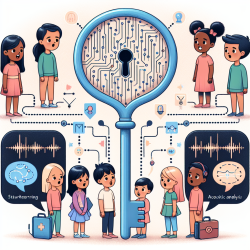In the ever-evolving landscape of education, the need for comprehensive and accessible therapy services has never been more crucial. Special education funding agencies play a pivotal role in ensuring that schools have the resources they need to support every student. One transformative solution that is gaining traction is online therapy services, which have the potential to revolutionize school culture and significantly impact student outcomes.
Online therapy services, such as those provided by TinyEYE, offer a flexible and effective approach to delivering speech therapy and other therapeutic interventions directly to students in schools. This innovative model not only addresses the logistical challenges of providing in-person therapy but also fosters a more inclusive and supportive school environment.
The Impact of Online Therapy on School Culture
Integrating online therapy services into schools can profoundly enhance the overall school culture in several ways:
- Accessibility: Online therapy ensures that all students, regardless of location or mobility issues, have access to the services they need. This inclusivity promotes a sense of belonging and equity within the school community.
- Consistency: With online therapy, students can receive consistent and uninterrupted services, even during disruptions such as school closures or personal absences. This reliability helps maintain progress and fosters a stable learning environment.
- Collaboration: Online platforms facilitate better collaboration between therapists, teachers, and parents. This integrated approach ensures that everyone involved in the student's education is on the same page, leading to more cohesive and effective support.
- Resource Optimization: By utilizing online therapy services, schools can optimize their resources, allowing them to allocate funds and personnel more efficiently. This can lead to improved overall school operations and enhanced student support services.
Case Studies: Success Stories from Schools
Several schools have already experienced the positive impact of integrating online therapy services into their educational framework. Here are a few examples:
- Lincoln Elementary: By implementing online speech therapy services, Lincoln Elementary was able to reduce the wait time for students needing evaluations and interventions. This timely support resulted in noticeable improvements in students' communication skills and overall academic performance.
- Riverside Middle School: Riverside Middle School saw a significant increase in student engagement and participation after introducing online therapy. The flexible scheduling allowed students to receive therapy sessions without missing critical classroom instruction, leading to better academic outcomes.
- Maple High School: At Maple High School, the use of online therapy services facilitated better communication between therapists and teachers. This collaboration enabled more tailored and effective intervention strategies, which positively impacted students' social and emotional well-being.
Why Special Education Funding Agencies Should Consider Online Therapy Services
Special education funding agencies have a unique opportunity to support schools in adopting innovative solutions like online therapy services. By investing in these services, agencies can help schools create a more inclusive and supportive environment for all students. Here are some compelling reasons to consider:
- Cost-Effectiveness: Online therapy services can be more cost-effective than traditional in-person therapy, allowing agencies to maximize their budgets and support more schools.
- Scalability: The flexibility of online therapy makes it scalable, enabling agencies to extend services to a larger number of students across various locations.
- Data-Driven Outcomes: Online platforms often come with robust data tracking and reporting features, providing valuable insights into student progress and the effectiveness of interventions. This data can inform future funding decisions and program improvements.
In conclusion, the integration of online therapy services in schools presents a promising avenue for enhancing school culture and improving student outcomes. Special education funding agencies have a critical role to play in supporting this transition. By taking the next step and investing in online therapy services, agencies can help create a more equitable, efficient, and supportive educational environment for all students.










